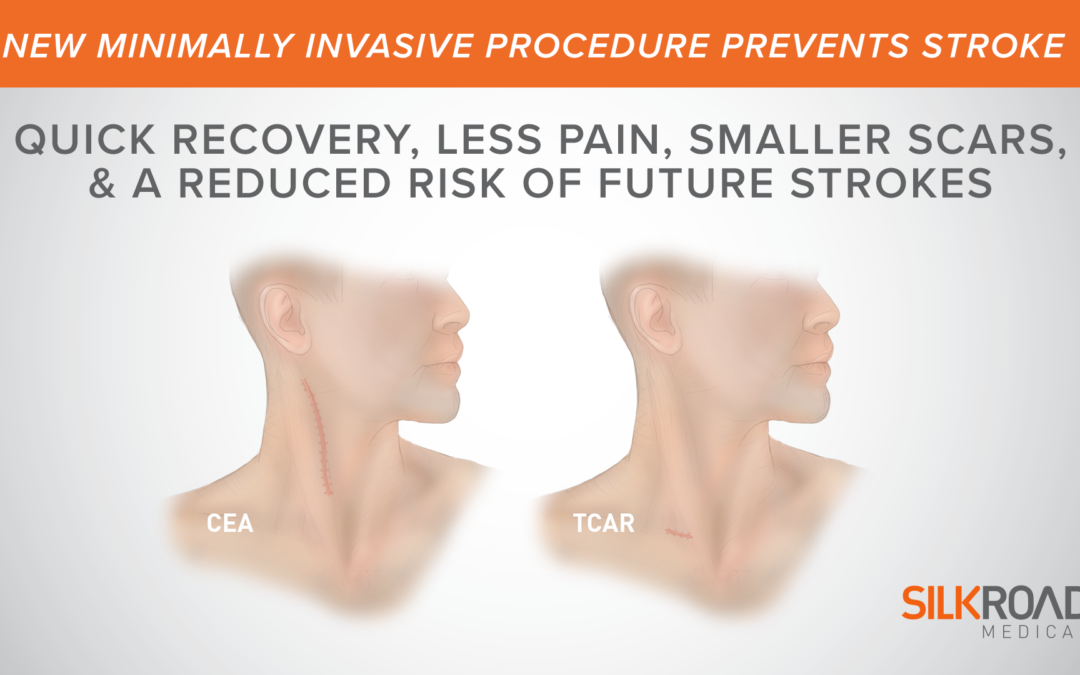Trans-Carotid Artery Revascularization (TCAR) is an advanced medical procedure performed to treat carotid artery disease. TCAR is a good treatment choice for some patients with carotid artery disease. Here’s some information for patients who have questions about carotid artery disease and TCAR.
Arteries Deliver the Good and the Bad
Your arteries deliver nutrient-rich, oxygenated blood to the far reaches of your body. Your carotid arteries are the ones that deliver oxygenated blood from your heart to your brain. There are two sets of carotid arteries on each side of your body that extend from your upper chest, through your neck, and up to your head.
When carotid arteries are clean and clear, blood flows well and circulates through your brain as it should. If something clogs the flow of blood to your brain, you could have a stroke and suffer permanent physical damage.
When a patient has carotid artery disease, fatty deposits called plaque builds up inside the carotid arteries. Plaques are clumps composed of:
- Cholesterol
- Calcium
- Fibrous tissue
- Cellular debris
As people age, they can suffer tiny wounds in the carotid arteries and other blood vessels. Plaque gathers over these microscopic injuries and causes the arteries to become stiff. This medical condition is called atherosclerosis (named after the calcified fat, or atheroma).
Arteries can narrow from the extra material and fail to deliver adequate blood flow. Clumps of plaque can break free and completely block a section of the artery. Strokes and heart attacks are imminent risks if plaque particles break free and travel to the blood vessels that feed the brain.
Surgery, Stents, and Other Procedures Are Invasive and Risky
Doctors can perform a carotid endarterectomy (CEA) to manually remove plaque deposits inside the carotid arteries. This procedure is a common treatment for atherosclerosis in the carotid arteries and involves opening up the neck with an incision.
Doctors have developed methods to protect carotid arteries using devices called stents. Stents enlarge the inner diameter of the carotid artery and help hold the plaque in check.
Another method is called balloon angioplasty. The angioplasty procedure involves inflating a tiny segment of tubing inside the artery. This treatment increases blood flow and flattens plaque deposits against the vein walls.
Both stent placement and angioplasty involve running a line up from an artery beginning in the groin or arm. These procedures carry an increased risk for additional complications such as the risk of stroke. CEA is also a risky procedure since a piece of plaque could escape the surgeon’s hand during the removal of the deposits.
TCAR Redirects Blood Flow
When doctors place a stent or perform other treatments on clogged arteries, they don’t want the blood to flow to the brain. Instead, they want the arterial blood to bypass the brain, so any dislodged debris can’t block a smaller artery in the brain and cause a stroke.
Trans-Carotid Artery Revascularization uses an innovative method to reverse and divert blood flow out of the carotid artery and into another artery in the leg. Any debris is filtered and doesn’t have a chance to head directly into the blood vessels that feed the brain. The brain continues to have safe blood circulation during the flow reversal.
Better still, the TCAR procedure is accomplished without running a line through the artery in the groin or arm. The TCAR procedure is performed using direct access to the carotid artery, so the procedure is not as invasive as CEA or other treatment options.
Trans-Carotid Artery Revascularization Offers Great Outcomes
Because the stent or angioplasty line doesn’t need to be threaded up the torso and into the carotid artery, the TCAR procedure takes less time than CEA and other treatments. One recent study compared outcomes of CEA versus TCAR and found promising results.
The results of the study showed a 30-minute reduction in operating room times for the TCAR method. Less time in the operating room means less time under anesthesia for vulnerable patients. In fact, TCAR can be performed with only local anesthesia in some cases, which is much safer for some medically fragile patients.
The minimally invasive technique of accessing the carotid artery directly and diverting blood flow during the procedure cut the occurrence of cranial nerve injury by a third. The study also revealed a lower incidence of post-operative high blood pressure in the research patients.
Many of the TCAR patients in the study were sicker and older than the CEA patients in the study. However, outcomes were similar for both groups of patients, despite the disparity in their pre-operative medical conditions.
TCAR can be a lifesaver for patients who are at high risk of stroke or heart attack due to carotid artery disease. The TCAR procedure is a faster way to repair your carotid arteries while protecting you from some of the complications of carotid artery surgery.
Your doctor can advise you on whether or not you’re a candidate for TCAR treatment. You may need to take courses of anticoagulants and other medications before you can receive TCAR treatment.
Find out if you’re a candidate for TCAR surgery by contacting The Surgical Clinic today. We offer carotid artery surgery for patients throughout Nashville, Smyrna, Lebanon and Columbia, Tennessee.
Meet Some of our Vascular Surgeons

Dr. Julia Boll
Vascular Surgeon
VIEW PROFILE

Dr. Jeffrey B. Dattilo
Vascular Surgeon
VIEW PROFILE

Dr. JimBob Faulk
Vascular/Endovascular Surgeon
VIEW PROFILE

Dr. Bryan T. Fisher
Vascular Surgeon
VIEW PROFILE

Dr. Brian Kendrick
Vascular Surgeon
VIEW PROFILE

Dr. Billy J. Kim
Vascular Surgeon
VIEW PROFILE

Dr. Allen Lee
Vascular Surgeon
VIEW PROFILE

Dr. Caroline Nally
Vascular Surgeon
VIEW PROFILE

Dr. Adam Richter
Vascular/Endovascular Surgeon
VIEW PROFILE

Dr. Mark Shelton
Vascular Surgeon
VIEW PROFILE

Dr. Todd H. Wilkens
Vascular Surgery
VIEW PROFILE

Dr. Patrick Yu
Vascular Surgeon
VIEW PROFILE

